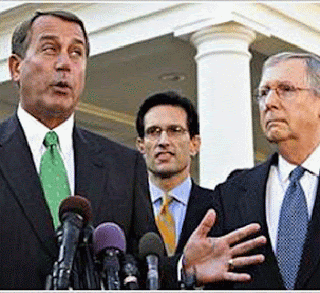It is not what the GOP wants it to be about: some kind of ideological, abstract debate about government and freedom. It's a practical question about whether the US needs a correction from thirty years of center-right (yes, I include Clinton in that consensus) and then hard-right governance. That practical question requires engagement with the specifics of America's needs at this present moment. It is not un-American to favor private enterprise and small government, as Romney presents his own views. Far from it. Equally, it is emphatically not un-American to stress the parallel importance of collective infrastructure, institutions and public goods which are essential to free enterprise's flourishing. If you don't believe me, go read Adam Smith. Small government doesn't mean no government…
When people ask me how I can remain proud of supporting Ronald Reagan in 1980 and also proud of supporting Barack Obama in 2012, I can simply say: there is no contradiction. Reagan was right for his time; Obama is right for his. Both conservatism and liberalism have a role to play in guiding America toward balance and success. They exists as traditions that help correct each other's excesses. And that is why the Republicans' current insistence that liberalism is inherently un-American is so un-conservative. It is without the context Reagan provided; it has no time and place to measure itself by; it is pretty close to theology, rather than politics.
And it seems to me that the problem of 2012 is not excessive government (although there are plenty of ways in which government could and should be leaner and more efficient, a project Obama has been engaged on). The problem is weak government when it came to regulating the financial sector; insolvent government because of a refusal to raise taxes even as spending has soared and revenues have collapsed; and hubristic government that tried to being freedom to every person on the planet through military occupation. And the answer is not doubling down on theology, but restoring limited but effective government in areas where only government can work.
Here's why we need it, in this present crisis, to coin a phrase:
America is worse off than it was 30 years ago — in infrastructure, education and research. The country spends much less on infrastructure as a percentage of gross domestic product (GDP). By 2009, federal funding for research and development was half the share of GDP that it was in 1960. Even spending on education and training is lower as a percentage of the federal budget than it was during the 1980s ... In 2001, the World Economic Forum ranked U.S. infrastructure second in the world. In its latest report we were 24th. The United States spends only 2.4 percent of GDP on infrastructure, the Congressional Budget Office noted in 2010. Europe spends 5 percent; China, 9 percent.As for economic freedom, America remains the fifth most competitive country in the world and the most competitive of major countries.
When Chief Justice John Roberts
emerged from behind the red curtain and took his seat at the center of
the Supreme Court bench last Thursday, he did not look like his usual
self. The brisk confidence of the Midwestern burgher was absent,
replaced by a more sombre mien. His eyes were red-rimmed and downcast,
his voice nearly a mumble. The announcement of the Court’s decision in
National Federation of Independent Business v. Sebelius was clearly an
unhappy duty for him. It’s easy to see why. By affirming the
constitutionality of the Affordable Care Act—the legislative cornerstone
of Barack Obama’s Presidency—Roberts was disappointing those closest to
him. Roberts was a professional Republican: a staffer in the Reagan and
Bush I Administrations, a judge and a Justice thanks to Bush II. And
here, alone and exposed, Roberts joined with the Court’s four liberals
to dash the Republican Party’s most fervent wishes. It was a singular
act of courage.



























